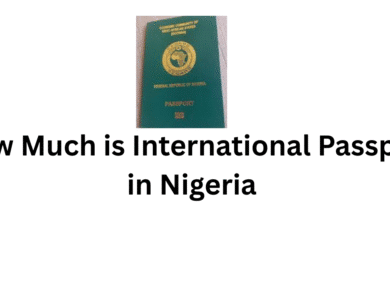Dreaming of studying abroad, migrating, or advancing your career in an English-speaking country? The International English Language Testing System (IELTS) is often your golden ticket. But for many Nigerians, the first question that comes to mind isn’t about preparation – it’s about the financial commitment. “How much is IELTS in Nigeria?” is a query that echoes in countless aspiring candidates’ minds, especially given the fluctuating economic landscape.
This blog post will delve into the current costs of taking the IELTS exam in Nigeria, breaking down the different test types and exploring the factors that influence the price. We’ll also touch on potential additional expenses you might encounter on your IELTS journey, so you can budget effectively and confidently pursue your international aspirations.
How Much is IELTS in Nigeria
Here’s a general breakdown of the approximate fees for different IELTS test types:
- IELTS Academic (Computer-Based & Paper-Based): Expect to pay in the range of ₦266,000 to ₦298,000. While paper-based options might still be available from some centers, computer-based is becoming increasingly common.
- IELTS General Training (Computer-Based & Paper-Based): Similar to Academic, the cost is typically in the range of ₦266,000 to ₦298,000.
- IELTS UK Visas and Immigration (UKVI): This specific test, required for certain visa applications to the UK, generally costs around ₦285,500 to ₦300,000. The slight increase accounts for enhanced security measures and administrative compliance.
- IELTS Life Skills (A1 and B1): For those needing to prove their English language proficiency for UK family visa routes, the cost is around ₦249,000 to ₦269,000.
Important Note: Prices can vary slightly between different test centers and may be subject to promotional offers or discounts from independent registration agents. Always verify the latest fees directly with the official test providers (British Council or IDP Education) or their authorized partners before making any payment.
Factors Influencing IELTS Costs
Several factors contribute to the pricing of the IELTS exam in Nigeria:
- Exchange Rate Fluctuations: This is perhaps the most significant factor. The base cost of the IELTS exam is set in international currencies, and as the Naira weakens against these currencies, the local price tends to increase to cover the operational costs for test providers.
- Test Type: As seen above, different IELTS modules (Academic, General Training, UKVI, Life Skills) have slightly varying price points due to the specific requirements and administrative overhead associated with each.
- Administrative and Operational Costs: The costs involved in administering the test, including venue rentals, invigilator fees, equipment, and maintaining secure testing environments, contribute to the overall price.
- Location of Test Center: While the core fee is largely consistent, some test centers in remote areas might have slightly different pricing structures due to logistics, though this is less common for the main registration fee.
- Promotional Offers/Discounts: Occasionally, some authorized registration centers or even the British Council/IDP might offer temporary discounts or bundled packages that can reduce the overall cost. These are usually time-sensitive.
Beyond the Registration Fee: Hidden Costs to Consider
While the registration fee is the most substantial expense, aspiring candidates should also budget for other potential costs:
- Preparation Materials and Courses:
- Self-Study Materials: Official Cambridge IELTS practice books, online subscriptions (e.g., Magoosh, IELTS Liz), and other study guides can range from ₦5,000 to ₦50,000 or more, depending on the resources you choose.
- Preparation Courses: Enrolling in a physical or online tutorial center can be a significant investment, ranging from ₦25,000 to ₦150,000 or even higher, depending on the duration, intensity, and reputation of the center. Some registration centers offer free classes as part of their package, so it’s worth inquiring.
- Logistical Costs:
- Transportation: If your nearest test center is not in your immediate vicinity, you’ll need to factor in transportation costs to and from the venue on test day. For candidates in remote areas, this might even involve inter-state travel.
- Accommodation: If you need to travel a considerable distance to a test center, budgeting for an overnight stay or two might be necessary, adding to your expenses.
- Administrative Fees (in specific cases):
- Rescheduling Fee: If you need to change your test date after registration, an administrative fee is usually charged, especially if the change is made close to the original test date.
- Additional Test Report Forms (TRFs): While you receive one free TRF, ordering additional copies to send to multiple institutions may incur a small fee per copy.
- Enquiry on Results (EOR) Fee: If you are dissatisfied with your score and wish to request a re-mark, there’s a fee for the EOR service. This fee is typically refunded if your score changes.
Conclusion
Understanding the cost of IELTS in Nigeria is undoubtedly a critical first step on your journey toward international education, work, or migration. As we’ve seen, the fees, currently ranging from ₦266,000 to ₦300,000 for the various test types, are influenced significantly by economic factors like the exchange rate. This means staying updated with the latest figures directly from the British Council or IDP Education is paramount to avoid surprises.
Beyond the core examination fee, remember to factor in potential additional expenses for preparation materials, tutoring, transportation, and even accommodation. A holistic budget will empower you to navigate the process with greater confidence and less financial stress.
FAQs
How long does the IELTS take in Nigeria?
The total test time for IELTS is approximately 2 hours and 55 minutes. This includes the Listening, Reading, and Writing sections, which are completed in one sitting with no breaks. The Speaking test is a separate face-to-face interview and can be taken on the same day or up to seven days before or after the other three sections, depending on the test center’s schedule.
How long is IELTS valid for?
IELTS results are generally considered valid for two years from your test date. While some institutions might accept older scores if you can prove you’ve actively maintained your English proficiency, it’s widely recommended to aim for scores within this two-year window.
Can I take an IELTS test online at home?
Yes, for the IELTS Academic test, you can take it online from home in Nigeria through IELTS Online, provided by the British Council. This option requires a stable internet connection, a quiet and private room, and a computer meeting specific technical requirements. However, it’s important to note that IELTS Online is not accepted by immigration authorities for visa applications; it’s primarily for academic purposes.
What is the passing score for the IELTS exam?
There is no official “pass” or “fail” score for the IELTS exam. Instead, you receive a band score from 1 to 9 for each of the four sections (Listening, Reading, Writing, and Speaking), and an overall band score. What constitutes a “good” or “passing” score depends entirely on the requirements of the institution, university, or immigration authority you are applying to. Each organization sets its own minimum band score criteria.
Can I go to the UK with a 4.5 IELTS score?
Whether you can go to the UK with a 4.5 IELTS score depends entirely on the specific visa type and institution/job requirements. For some UK visa categories, particularly those requiring a Common European Framework of Reference for Languages (CEFR) level B1, an IELTS for UKVI score of 4.0 in all four components (Listening, Reading, Writing, Speaking) might be sufficient.
However, for most universities, especially at the undergraduate or postgraduate level, and for many skilled worker visas, a score of 5.5, 6.0, 6.5, or even 7.0+ is typically required. A 4.5 overall might be too low for most mainstream study or work routes. Always check the official UK government website (GOV.UK) or the specific institution’s requirements for the most accurate information.
How many attempts for IELTS?
There is no limit to how many times you can take the IELTS test. You can retake the exam as many times as you like until you achieve your desired score. It’s advisable to spend time on additional study and preparation before re-attempting the test if you didn’t meet your target on a previous attempt. Additionally, the IELTS One Skill Retake option is available in some centers, allowing you to retake just one of the four skills (Listening, Reading, Writing, or Speaking) if you need to improve a specific area without redoing the entire test.
How many questions are in IELTS?
Here’s a breakdown of the number of questions in each IELTS section:
- Listening: Approximately 40 questions across 4 sections.
- Reading: 40 questions across 3 sections/passages (Academic and General Training versions have different content but the same number of questions).
- Writing: 2 tasks (Task 1 and Task 2).
- Speaking: Consists of 3 parts (an introduction and interview, a long turn on a given topic, and a discussion based on the topic). The number of questions varies based on the flow of the conversation with the examiner.













